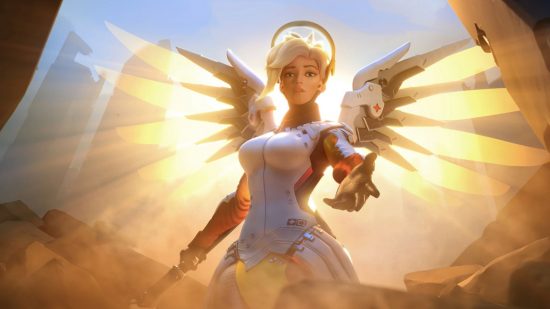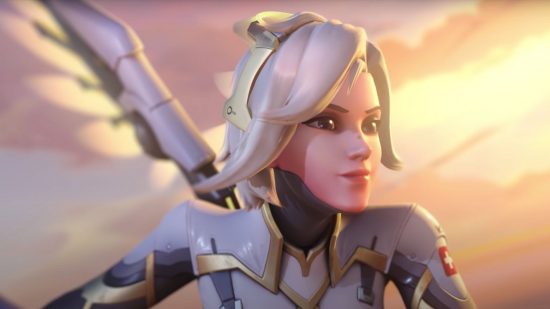It’s hard to overstate Lucie Pohl’s impact on the Overwatch community. As the voice of Mercy in both Overwatch 2 and its predecessor, those who know her are acutely aware of what she represents in her portrayal of one of the most iconic videogame characters of the past decade. Mercy may be fictional, but the Overwatch 2 healer stands for something much bigger. She’s beautiful, strong, empathetic, and brilliant – a far reach from the princesses in need of rescuing that dominated the gaming landscape when Pohl was growing up.
Pohl admits she is very different than Mercy; the fictional character is a scientist who created a borderline miraculous healing suit, while Pohl is a German-born actor and comedian, for starters. But there’s an obvious essence in Pohl that shines through in her portrayal of the well-written, complex Mercy.
“Voices express a lot of a person’s essence, even if you can’t put your finger on what that is,” she tells PCGamesN. “It’s just in me, this character – this softness, sassiness, and strength at the same time. Somehow my voice expresses and embodies that. So, I’ve never had a hard time stepping into Mercy.”
Pohl, who recorded her Mercy audition while staying at her mother’s house after a breakup, had little idea at the time that the gig would be a life-changing opportunity. Now going on seven years later, that audition and subsequent callback have granted her opportunities many voice actors could only dream of. She’s traveled around the world to meet fans at conventions, connected with them through her stand-up comedy, and interacted with them further via a Twitch show called Immigrant Jam that she hosted throughout the height of the COVID-19 pandemic, which she continues to produce as a podcast.
The format of the Twitch show also presents viewers with the chance to connect with other Overwatch voice actors, along with the likes of Roger Clark (Red Dead Redemption 2) and Nolan North (Uncharted).
Pohl shares how she recently heard from Lumi, a nonbinary person who first broke out of their shell by appearing on the show. Lumi messaged Pohl to share that they were recently given the opportunity to go on a talk show in their country to discuss their experiences as a queer person. They credited their ability to do so to their improvisational interactions with Pohl and her guests. And for Pohl, this exemplifies what Mercy and the rest of the Overwatch cast mean to fans.
“There are a lot of videogames that I don’t know, so I’m not pretending I know everything about videogames. But from my understanding, what was so groundbreaking for this game is that it really was inclusive, but not for the sake of inclusivity and not on a superficial level. The characters were real, they had backstories. They were three-dimensional,” she says.
“There are so many people who want to go into caregiver fields or medical fields who love Mercy and look up to her. A lot of girls come to my table and say that she’s inspired them not to take any s**t from anybody because she’s very feminine but still kind of a badass at the same time,” she says.
While there are times when people have blurred the reality of Pohl as a person and Mercy as a fantasy by asking Pohl to sign inappropriate items or by sending illicit messages, she feels this is something that comes with the territory of being a public person. Rather, she finds the blatant toxicity against women that continues to fester within some gaming subcultures far more concerning.
“I think the toxicity is worse for the girls who just want to be gamers or who just want to be on equal footing and participate in the same way and get bullied and harassed. A lot of them don’t have a thick enough skin, and then they stop gaming, or they stop streaming, or they stop being interested. They go to something else when they may have been very good at whatever they were doing in that world. And I think that’s sad,” she tells us.
That’s at least partially what drives Pohl to speak out honestly about her own experiences and find ways to support and encourage women. But she believes that the key to success in the gaming world isn’t simply to conform to masculine standards.
“This is something that I always go on and on about. That’s really important to me to always get out as a message to young girls and women or female-identifying people: To be a strong woman doesn’t mean you have to be a man,” she says.
Mercy embodies this sentiment in the multiplayer game. To Pohl and many others, she is a role model, demonstrating that people are far more complex than their looks, intelligence, or any other singular trait.
But there’s room for more nuance in these depictions, too. Today’s games rarely reflect the realities of women’s daily lives. In Red Dead Redemption 2, protagonist Arthur Morgan has the option to shave his beard, but it’s virtually unheard of that a woman character would shave her legs. “Next time I’m in an Overwatch session, I’m going to tell them to put in a scene where Mercy shaves,” Pohl jokes.
The same can be said about periods, which effectively don’t seem to exist for videogame characters. “It would be revolutionary to have a character in a videogame not be able to fight or something [due to her period],” she says.
In future, Pohl would love to draw on her personal experiences to voice gender-bending fantasy characters. However, with Mercy, she feels she already has the best opportunity she could ask for.
“Mercy stands for something so beautiful. She stands for compassion, empathy, and healing, and that’s something I think is, like… How do you get better? How can you get better than that in terms of a dream role?”



